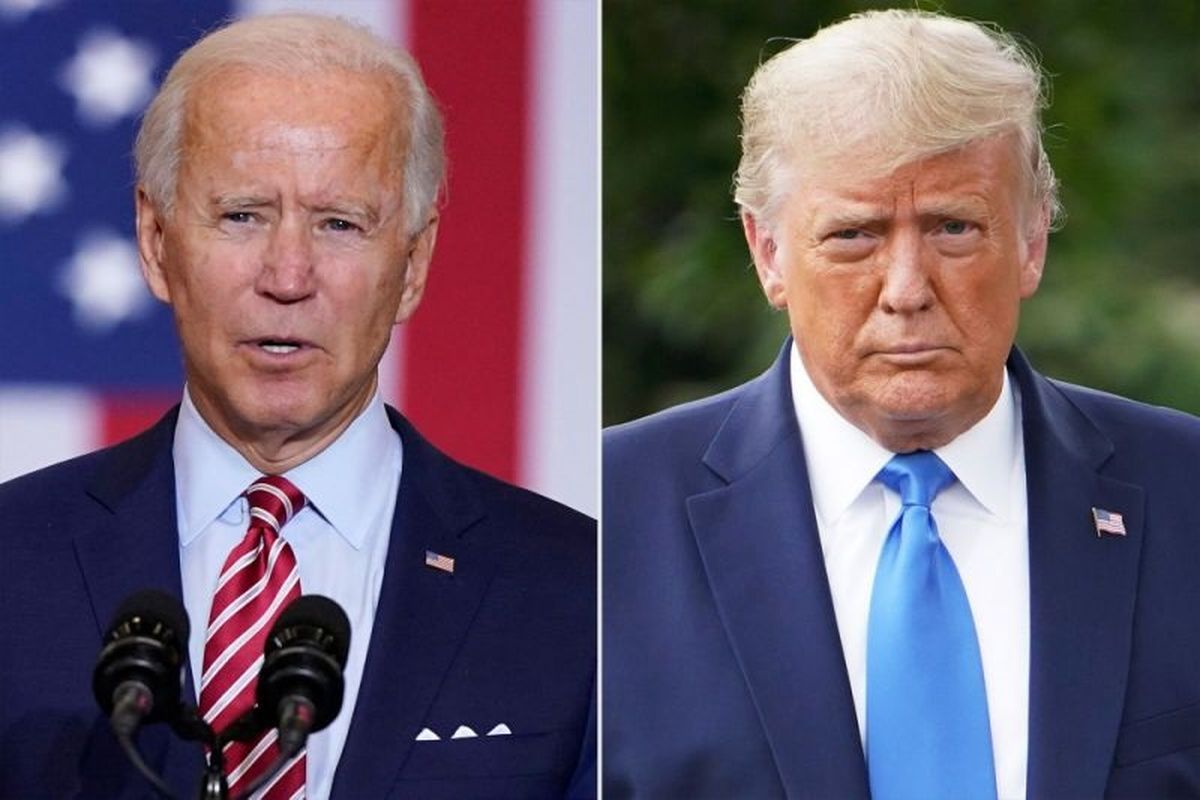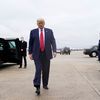Trump vs Biden Policies 2020: Where Do They Stand on Key Issues?

WASHINGTON, KOMPAS.com - As Election Day draws near in the US, the policies offered by President Donald Trump and Joe Biden are all but similar.
Although the 2020 US presidential election has been racially charged and tumultuous, one dynamic that has remained constant is Trump’s and Biden’s policy path when either win the presidential ticket.
Trump’s policies, like many fellow Republicans, holds out tax reductions and regulatory cuts as economic imperatives and frames himself as a conservative champion in the culture wars.
The US President has offered few details about how he would pull the levers of government in a second term. His most consistent argument focuses on stopping Democratic opponent Joe Biden and his party from pushing US policy leftward.
Read also: Europeans Want Joe Biden to Win in US Election 2020: Poll
Joe Biden, for his part, is not the socialist caricature depicted by Trump.
But he is every bit a center-left Democrat who frames the federal government as the force to combat the coronavirus, rebuild the economy, and address centuries of institutional racism and systemic inequalities.
The former Vice President and US senator also offers his deal-making past as evidence he can do it again from the Oval Office.
A look at where the rivals stand on key issues:
Trump vs Biden Policies 2020: Economy and Taxes
Low unemployment and a soaring stock market were Trump’s calling cards before the pandemic.
While the stock market has clawed its way back after cratering in the early weeks of the crisis, unemployment stands at 7.9 percent.
The nearly 10 million jobs that remain lost since the pandemic began exceed the number that the nation shed during the entire 2008-2009 Great Recession.
President Donald Trump has predicted that the US economy will rebound in the third and fourth quarters of this year and is set to take off like a “rocket ship” in 2021.
He promises that a coronavirus vaccine or effective therapeutics will soon be available, allowing life to get back to normal.
Read also: Regeneron’s Unapproved Antibody Drug Praised as Trump Recovers
His push for a payroll tax cut over the summer was thwarted by stiff bipartisan opposition. But winning a second term — and a mandate from voters — could help him resurrect the idea.
First and foremost, Joe Biden argues that the economy cannot fully recover until Covid-19 is contained.
For the long-term recovery, he pitches sweeping federal action to avoid an extended recession and to address longstanding wealth inequality that disproportionately affects nonwhite Americans.
His biggest-ticket plans include a $2 trillion, four-year push to eliminate carbon pollution in the US energy grid by 2035 and a new government health insurance plan open to all working-age Americans (with generous subsidies).
Read also: Leaders Warn UN: If Covid-19 Doesn’t Kill Us, Climate Change Will
He proposes new spending on education, infrastructure and small businesses, along with raising the national minimum wage to $15 an hour.
The Democratic presidential nominee would cover some but not all of the new costs by rolling back much of the 2017 GOP tax overhaul.
He wants a corporate income tax rate of 28 percent (lower than before but higher than now) and broad income and payroll tax hikes for individuals with more than $400,000 of annual taxable income.
All that would generate an estimated $4 trillion or more over 10 years.
The Democratic presidential nominee frames immigration as an economic matter as well.
Read also: US Government to Reject New DACA Applications
He wants to expand legal immigration slots and offer a citizenship path for about 11 million residents who are in the country illegally but who, Biden notes, are already economic contributors as workers and consumers.
Trump vs Biden Policies 2020: Education
President Donald Trump has pushed for schools to fully reopen for in-person learning and announced that the federal government will begin distributing millions of rapid coronavirus tests to states.
He urged governors to use them to reopen schools for students in kindergarten through 12th grade.
Donald Trump has also used his call for schools to fully reopen as an opportunity to spotlight his support for charter schools and school choice.
Education Secretary Betsy DeVos, a longtime proponent of charter schools and school voucher programs, has suggested that families be allowed to take federal money allotted to school districts that don’t open and spend it on private schools that do open.
Read also: Schools in Indonesia-Malaysia Border Area Reopen during Covid-19 Pandemic
For most of President Donald Trump's first term, his administration sought major increases to federal charter school grant aid. Congress responded with relatively small increases.
With higher education, the US President has repeatedly complained that campuses are beset by “radical left indoctrination”.
He has threatened to defund universities and said he would ask the Treasury Department to reexamine the tax-exempt status and federal funding of unspecified schools.
The Democratic presidential nominee wants schools to get more federal aid for pandemic-related costs through the same federal law used after national disasters like hurricanes and wildfires.
Read also: This Year's Extreme Weather Consistent with Worsening Climate Change
Beyond Covid, Joe Biden wants the federal government to partner with states to make public higher education tuition-free for any student in a household earning up to $125,000 annually.
The assistance would extend to everyone attending two-year schools, regardless of income.
He also proposes sharply increasing aid for historically Black colleges. His overall education plans carry a 10-year price tag of about $850 billion.
He calls for universal access to prekindergarten programs for three- and four-year-olds; tripling Title I spending for schools with higher concentrations of students from low-income households; more support for non-classroom positions like on-campus social workers; federal infrastructure spending for public school buildings; and covering schools’ costs to comply with federal disability laws.
The Democratic presidential nominee also opposes taxpayer money being routed to for-profit charter school businesses, and he’s pledged that his secretary of education will have classroom teaching experience.
Trump vs Biden Policies 2020: Healthcare
As a candidate for the White House, Donald Trump promised that he would “immediately” replace President Barack Obama’s health care law with a plan of his own that would provide “insurance for everybody”. Americans are still waiting for his plan.
Trump recently returned to health care amid disapproval of his administration’s handling of the coronavirus pandemic and growing uncertainty about the future of the Affordable Care Act, which his administration is asking the Supreme Court to overturn.
President Donald Trump is reiterating his four-year-old promises for quality health care at affordable prices, lower prescription drug costs, more consumer choice, and greater transparency.
Read also: Indonesia to Pick Free Covid-19 Vaccine Recipients Based on Health Insurance Data
He also announced executive orders calling for an end to surprise medical bills and declaring it the policy of the US government to protect people with preexisting conditions, even if Obamacare is struck down.
However, protections for preexisting conditions are already the law, and Trump would have to go to Congress to cement a new policy through legislation.
In the first presidential debate, the US President also held out the repeal of Obamacare's individual mandate to have health insurance as significant progress, while ignoring questions about his lack of a comprehensive plan.
The Democratic presidential nominee wants to expand Obama's law to provide more generous coverage to a greater number of people and add a “Medicare-like public option” that would compete with private insurers and be available to working-age Americans.
Joe Biden estimates that would cost about $750 billion over 10 years.
That positions Biden between Trump, who wants to scrap the 2010 law, and progressives, who want a single-payer system to replace private insurance altogether.
Biden sees his approach as the next step toward universal coverage and one he could get through Congress.
The Democratic presidential nominee also has sought to turn the current Supreme Court vacancy into a healthcare matter, noting that the late liberal Justice Ruth Bader Ginsburg was a key vote in upholding the 2010 health care law.
Read also: America in Mourning Following Death of Justice Ruth Bader Ginsburg
Meanwhile Trump's nominee, federal appellate Judge Amy Coney Barrett, has criticized the court's reasoning in that decision.
Trump vs Biden Policies 2020: Coronavirus
Over the course of the summer, Trump went from acknowledging that the pandemic may “get worse before it gets better” to declaring that the US is “rounding the corner” on the crisis.
Then he tested positive for the virus himself.
The pandemic remains the biggest obstacle for his reelection hopes, and his bout with the virus just weeks before Election Day only brightened the spotlight on the issue.
Read also: Donald Trump Tests Positive for Coronavirus, Begins Quarantine
Roughly seven in 10 Americans think the nation is on the wrong track, and just 39 percent of Americans approve of Trump's handling of the crisis that has killed more than 207,000 people in the US, according to a recent poll The Associated Press-NORC Center for Public Affairs Research.
Congress approved about $3 trillion in coronavirus relief in March and April, and Democrats and the White House have been at loggerheads over another significant round of funding, with Trump sending mixed messages on what he wants.
President Donald Trump has largely placed responsibility with governors for leading the response.
Biden draws some of his sharpest contrasts with Trump on the pandemic, arguing that the presidency and federal government exist for such crises and that Trump has been an abject failure responsible for tens of thousands of preventable deaths.
Read also: Pelosi’s 25th Amendment Bid Gets US Congress to Discuss Trump’s Removal
Biden endorses generous federal spending to help businesses and individuals, along with state and local governments.
He’s also promised aggressive use of the Defense Production Act, a wartime law a president can use to direct certain private-sector activity.
Additionally, Joe Biden promises to elevate the government’s scientists and physicians to communicate a consistent message to the public, and he would have the US rejoin the World Health Organization.
He’s also willing to use executive power for a national mask mandate, but whether that is enforceable is questionable.
Trump vs Biden Policies 2020: Abortion
Years before his run for the White House, Trump described himself as a strong abortion rights proponent. But since coming to Washington, he has been cheered by anti-abortion groups for his administration's efforts to restrict access to the procedure.
As a candidate and as president, President Donald Trump has consistently expressed his opposition to the landmark Roe v. Wade decision that legalized abortion nationwide and said the issue should be decided by states.
He has expressed support for the Hyde Amendment, which prohibits Medicaid from being used to pay for abortions in most circumstances, and he's sought to restrict access to two drugs that are used to induce abortions in the first 10 weeks of pregnancies.
Read also: Past Writings Indicate Amy Coney Barrett May Reverse Roe v. Wade
In his Republican National Convention speech in August, the US President declared that “children, born and unborn, have a God-given right to life.”
Nominating Amy Coney Barrett, a 7th Circuit Court of Appeals judge, has the anti-abortion movement hopeful that the high court — should she win confirmation — will tilt decisively to the right and pave the way for the court to eventually overturn the Roe case.
Biden has declined to offer his own list of prospective Supreme Court nominees, but he's said repeatedly that he supports Roe v. Wade's finding that the Constitution establishes a woman's right to terminate a pregnancy.
Read also: Women Globally Lack Access to Contraceptives and Abortions during Lockdown
He's endorsed calls for Congress to codify that right, a move that would keep abortion legal statutorily even if the court struck down the constitutional protections.
A practicing Catholic, Biden talked publicly for years of his personal struggle over abortion as a moral issue.
The Democratic presidential nominee cited that as a reason he supported the Hyde Amendment ban on federal taxpayer funding for abortion services.
Read also: Roe v. Wade Reversal a Real Threat following Death of Ruth Bader Ginsburg
But he reversed that position early in his 2020 campaign after coming under pressure from women's groups and Democratic activists.
Biden said he wasn't bowing to pressure but instead argued that Republican legislatures around the country had restricted abortion access to the point that the Hyde Amendment had become an untenable barrier for poor or working-class women to access a constitutional right.
Trump vs Biden Policies 2020: Trade
President Donald Trump views the signing of two major trade deals — an updated pact with Mexico and Canada and Phase 1 of a China agreement — as signature achievements of his presidency.
US and China signed Phase 1 in January, less than two months before the pandemic put an enormous strain on US-China relations.
Trump says Phase 1 led to China buying roughly $200 billion over two years in US agricultural products, energy and other American products.
In return, the US canceled planned US tariffs on Chinese-made smartphones, toys and laptop computers.
Read also: UK Resumes US Trade Talks on September 8
The US also cut in half, to 7.5 percent, the tariff rate levied on $120 billion in other China imports.
Phase 2 of the deal is expected to focus on some tougher issues between the countries, including Trump’s wish to get China to stop subsidizing its state-owned enterprises.
But for Trump, who has come to frequently refer to the coronavirus as the “China virus”, it remains to be seen whether he will be able to effectively reengage Beijing on trade.
Trump recently said he’s currently “not interested” in talking to China.
Biden has joined a growing bipartisan embrace of “fair trade” abroad — a twist on decades of “free trade” talk as Republican and Democratic administrations alike expanded international trade.
Joe Biden wants to juice US manufacturing by directing $400 billion of federal government purchases to domestic firms (part of that for buying pandemic supplies) over a four-year term.
He wants $300 billion in new support for US technology firms’ research and development. Biden says the new domestic spending must come before he enters into any new international trade deals.
He pledges tough negotiations with China, the world’s other economic superpower, on trade and intellectual property matters.
Read also: Hong Kong’s Nathan Law Advises the West to Abandon Chinese Technology Ties
China, like the US, is not yet a member of the Trans-Pacific Partnership, the multilateral trade agreement that Biden advocated for when he was vice president.
Trump vs Biden Policies 2020: Foreign Policy
During his first term, Trump built his foreign policy around the mantra of “America First”.
But in the final lap before Election Day, Trump has been offering himself as an international peacemaker for nudging the Gulf monarchies of Bahrain and the United Arab Emirates to sign agreements with Israel opening business and diplomatic relations.
Trump says other Arab nations are on the cusp of opening formal relations with Israel.
Read also: Israel and UAE Peace Deal Delight World Leaders and Angers Palestinians
He also counts as major achievements building more than 200 miles (320 kilometers) of his promised wall along the US-Mexico border, cajoling more NATO members to fulfill their pledge to spend 2 percent of their gross domestic product on defense spending and reducing the US military footprint in Afghanistan and other hot spots.
He also announced his intended withdrawal from the Paris climate accord.
Trump can officially withdraw the US from the Paris agreement — it sets the goal of holding global warming below 3.6 degrees Fahrenheit — as an example of an agreement that “disadvantages the United States to the exclusive benefit of other countries.”
The deal, which was signed by Obama, stipulates that no nation can leave until four years after it signed on. For the US, that’s November 4 — one day after the US election.
Read also: Germany’s RV Polarstern Returns Home from North Pole, Warns of a ‘Dying Arctic’
The president has also made clear his desire to leave Afghanistan sooner than the timeline laid out in the February 29 peace agreement with the Taliban, which set the path for US troops to leave the country in 12 to 14 months if the insurgent group met certain conditions.
There are currently about 4,500 US troops in Afghanistan, and Trump has said he wants them all to be withdrawn by the end of the year.
Trump also counts his engagement with North Korea’s Kim Jong Un as a monumental achievement.
The president has not been able to prod Kim to give up his nation’s nuclear program, but he has met Kim three times — something Trump critics say has only legitimized the authoritarian leader.
Read also: Tighter Restrictions in North Korea as Covid-19 Cases Detected
Joe Biden says he would begin “the day after the election” rebuilding relationships with allies ruffled by Trump’s approach, which Biden mocks as “America alone”.
Biden’s top priority is reestablishing the foundations of NATO, the post-World War II alliance of Western powers that Biden said is necessary to counter Russia’s aggressive, expansionist aims in eastern Europe and Asia.
Biden also says he would immediately confront Russian President Vladimir Putin about his country’s interference in US elections.
Read also: Expect Foreign Interference from Russia, China, and Iran in US Presidential Election
Joe Biden pledges to “end forever wars” but clarifies that US special forces — as opposed to large-scale ground missions — remain a vital part of world stability.
He calls for rebuilding a decimated US diplomatic corps, rejoining the Paris climate accord and pushing China and other large economies to reduce carbon pollution.
(Writer: Bill Barrow, Aamer Madhani)
Simak breaking news dan berita pilihan kami langsung di ponselmu. Pilih saluran andalanmu akses berita Kompas.com WhatsApp Channel : https://www.whatsapp.com/channel/0029VaFPbedBPzjZrk13HO3D. Pastikan kamu sudah install aplikasi WhatsApp ya.

































